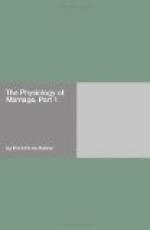“When I write and speak of myself in the singular, this implies a confidential talk with the reader; he can examine the statement, discuss it, doubt and even ridicule it; but when I arm myself with the formidable we, I become the professor and demand submission.”— Brillat-Savarin, Preface to the Physiology of Taste.
December 5, 1829.
FIRST PART.
A general consideration.
We will declaim against stupid laws until they are changed, and in the meantime blindly submit to them.—Diderot, Supplement to the Voyage of Bougainville.
MEDITATION I.
THE SUBJECT.
Physiology, what must I consider your meaning?
Is not your object to prove that marriage unites for life two beings who do not know each other?
That life consists in passion, and that no passion survives marriage?
That marriage is an institution necessary for the preservation of society, but that it is contrary to the laws of nature?
That divorce, this admirable release from the misfortunes of marriage, should with one voice be reinstated?
That, in spite of all its inconveniences, marriage is the foundation on which property is based?
That it furnishes invaluable pledges for the security of government?
That there is something touching in the association of two human beings for the purpose of supporting the pains of life?
That there is something ridiculous in the wish that one and the same thoughts should control two wills?
That the wife is treated as a slave?
That there has never been a marriage entirely happy?
That marriage is filled with crimes and that the known murders are not the worst?
That fidelity is impossible, at least to the man?
That an investigation if it could be undertaken would prove that in the transmission of patrimonial property there was more risk than security?
That adultery does more harm than marriage does good?
That infidelity in a woman may be traced back to the earliest ages of society, and that marriage still survives this perpetuation of treachery?
That the laws of love so strongly link together two human beings that no human law can put them asunder?
That while there are marriages recorded on the public registers, there are others over which nature herself has presided, and they have been dictated either by the mutual memory of thought, or by an utter difference of mental disposition, or by corporeal affinity in the parties named; that it is thus that heaven and earth are constantly at variance?
That there are many husbands fine in figure and of superior intellect whose wives have lovers exceedingly ugly, insignificant in appearance or stupid in mind?
All these questions furnish material for books; but the books have been written and the questions are constantly reappearing.




